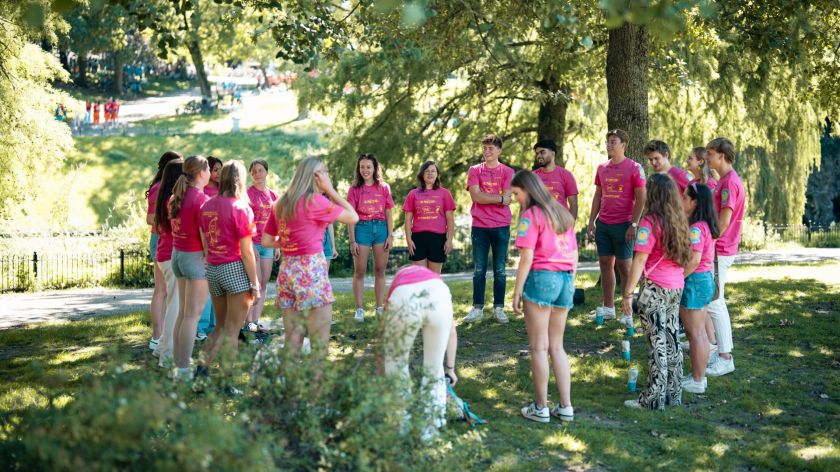Declining number of internationals at Radboud but increases in AI and Philosophy
-
 Introductie 2023. Foto: Johannes Fiebig // Diede van der Vleuten
Introductie 2023. Foto: Johannes Fiebig // Diede van der Vleuten
Less international psychology students, increased enrolment in Artificial Intelligence and Philosophy – and a continuous dwindling of internationals at Radboud in general. Those are the most important findings on international enrolment in this year’s October numbers. And with policy changes about to come next year – a decrease that is likely to continue.
Radboud’s October numbers have been released – and as the yearly report detailing developments at the university shows, there are again fewer international students opting for a degree at Radboud University than last year. The development is in line with a slight overall decrease in student enrolment at the university. While 24.633 students were enrolled at Radboud University in 2022, over two-hundred students less enrolled for this study year.
But while the overall shrinkage of international and Dutch students enrolled at Radboud remains relatively marginal – a minus of 1,56 per cent and 0,94 per cent respectively – some numbers are more striking. While the first-year bachelor enrolment for students from other EU countries has, for example, decreased by 20,9 per cent this year, non-EU first-year bachelor enrolment on the other hand has increased by 35,5 per cent from last year.
Additionally, while German students remain the by far largest international student population at the university, the total number of German enrolments has fallen below thousand for the first time in years, decreasing by 13,02 per cent from last year’s already significant decrease. Over the last five years, German enrolment has plummeted by almost 30 per cent.
Psychotherapy
The declining numbers of German student enrolment at Radboud have largely been attributed to a change in the German psychotherapy law, which makes it much harder for German students to opt for a psychotherapy trajectory in their home country after completing a bachelor’s at Radboud or other Dutch universities.
Next to the developments in the psychotherapy law, an increasingly difficult housing market was attributed to last year’s massive decrease in German first-year enrolment in the psychology bachelor – from 156 German first-year enrolments in 2021 to 93 in 2022. For 2023, the trend continues, with only 61 German first-year enrolments in Psychology this year, a 34,41 per cent decrease.
Psychology has long been a popular study for German students in the Netherlands, because of its English language programmes, high quality of education, and relative accessibility in comparison to Germany’s own psychology degrees that often require students to have a very high GPA.
While it is currently unclear how the trend of German student enrolment at Radboud – long a stable international population at the university – will develop in the upcoming years, Germans presently remain a significant population at the university, with a total of 882 Germans enrolled at Radboud this year. The next larger student populations, Greek, Romanian, and Polish students, only count 167, 155, and 141 total student enrolments for this study year respectively.
Artificial Intelligence
However, while German student enrolment for Psychology is decreasing substantially, international student enrolment at the Faculty of Social Sciences (FSW) overall – the largest faculty and also the faculty with the most international student enrolment – has decreased only slightly. This can partially be explained by increasing international student enrolments in the Artificial Intelligence bachelor – with 47,37 per cent more international first-year enrolment from EER countries and a 171,43 per cent increase in first-year enrolment for students from non-EER countries.
The increase in international student enrolment in Artificial Intelligence has, however, likely less to do with the increasing discourse surrounding ChatGTP over the past months. According to the university’s October numbers report, the growth can be explained by an absence of a numerus fixus for the programme this year, which has increased its total first-year enrolment from 155 first-year students in 2022 to 242 in 2023.
Increase and decrease
The largest overall decrease of international students this year has been at the Law Faculty, with almost 25 per cent fewer international students enrolled at the faculty in comparison to last year. The Faculty of Philosophy, Theology and Religious Studies, on the other hand, shows the largest growth in student enrolments – 20,95 per cent from last year and a whopping 139,6 per cent growth over a five-year period.
The only other faculty with consistent growth has been the Faculty of Science, which increased its international student enrolment by more than 50 per cent over the last five years. Albeit slowing down a bit this year, with a smaller increase of 4 per cent. Science thereby remains the faculty with the second-largest international student population, only surpassed by FSW.
Trend
Whether the trend of decreasing international student enrolment will continue over the next years remains to be seen. According to the university, the goal remains to increase its international student population.
However, starting next study year, the university has also announced a change in its housing assistance policy for international students. Starting with the study year 2024-2025, the university will not support bachelor students following a three-year degree in finding housing anymore. Instead, international master students enrolling a one-year or two-year degree will receive a housing contract for the entire length of their studies.
It is expected that these policy changes will have an impact on the number of international bachelor’s students being able to enrol at Radboud next year. The decision to change the housing policy has been sharply criticized by some members of the university, with assistant professor Dorian Schaap writing that the university’s ‘global vision’ has been abandoned with the decision.
Internationalization at Dutch universities furthermore remains a controversial topic of discussion prior to the Dutch elections, with some parties calling for a limit on international students as well as a decrease of English-language programmes at Dutch universities.



